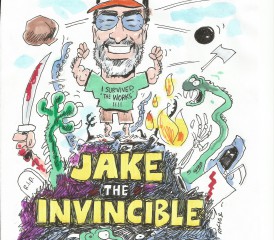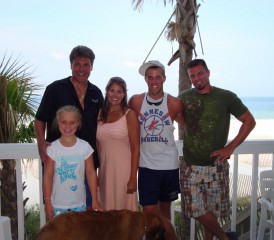Mesothelioma Survivor Determined and Defiant in His Fight

Fact Checked | Written by: Tim Povtak | Last Update: 10/23/2024 | 6 Min Read
The self-portrait of Jacob H. speaks volumes about his attitude toward the diagnosis of peritoneal mesothelioma he received in 2010.
Jacob titled it “Jake the Invincible,” a caricature of him standing triumphantly atop the mesothelioma carnage that was expected to crush him, much like it has so many others.
He refused to wave a white flag of surrender.
Anything else would have been a surprise to those who know this strong-willed fitness buff who was playing rugby as recklessly as he ever did not long before his diagnosis.
He stands proud and defiant in the portrait, rising above the rubble that includes a bloodied sword, a R.I.P. headstone, a skeleton arm and the serpents coming after him. His arms are raised in victory, a Baltimore Orioles baseball cap atop his head.
“If mesothelioma was going to take me down, it was going to have one hell of a fight on its hands. That’s the promise I made,” Jacob said during a recent phone interview with Asbestos.com from his home in Maryland. “I’m going down swinging, I know that. It didn’t knock me out with the first punch, so now it’s my turn, and I’m going to make myself as strong as I can possibly be.”
Surgery and a Survival Strategy
The T-shirt he wears comes with an inscription: I Survived ‘The Works.’
Jacob, 60, is an inspirational survivor, a testament to the specially named “Quality of Life” treatment regimen promoted by surgical oncologist Richard Alexander, M.D., at the University’s Greenebaum Cancer Center.
The six-hour surgery that removed his peritoneal lining, spleen and appendix, along with part of his liver and colon, may have knocked down Jacob temporarily, but it left him more determined than ever.
“I told doc that while he was in there under the hood, he might also want to change the oil because I’ve got some miles left on these tires,” said Jacob, whose last name is being withheld over privacy concerns.
“It was tougher on my family than it was me. I know for my three kids, and they are all grown, that it was the only time in their lives they’d ever seen their dad, flat on his back, incapacitated. That was the moment it hit home for everyone. But like I told them, this (mesothelioma) was just a curve ball. If you’re going to play in the Big Leagues, you have to learn to hit the curve. Anyone can hit a fastball.”
Acknowledging His Good Fortune
Although Jacob jokes about his disease now, he understands how fortunate he is. He was younger, and considerably stronger physically, than most who are first diagnosed. That gives him quite an advantage in fighting off the cancer.
Working in the medical profession, he also knew the routine. He knew the surgeons, oncologists, radiologists, and nurses who treated mesothelioma patients at the University of Maryland.
He just never thought he would get to know them like this.
Jacob, a biomedical imaging engineer for Siemens Corp., went from peer to patient with his diagnosis. It came from a doctor/friend, who almost started to cry when he delivered the news.
“I told some of them, ‘I’ve never asked for a favor before, but I need one now.’ I think being in the profession helped me understand everything clearly, and that helped me through this. I’m sure I got the best possible care,” Jacob said. “I work side by side with some of these guys (doctors). And I’ve always said, ‘They put their pants on the same way I do, except they just have a little more change in their pockets.’ “
He never spent much time thinking about where he was exposed to the asbestos that caused his mesothelioma. It could have been any number of places.
He served in the Army from 1970-78 and lived in military housing that was loaded with asbestos. His father was a Navy man and worked among asbestos fibers for years, bringing it home on his clothes.
Jacob then worked at General Electric for nearly 20 years. His work with medical equipment at Siemens included considerable time spent in older hospitals around the Baltimore/Washington area, ones filled with asbestos that was so prevalent in the 20th century.
Exercise and Diet Key
Instead of wondering where and how, Jacob focused on the future and what kind of treatment he wanted. He consulted with several doctors before settling on Alexander. Both before and after surgery, he ate healthier. He worked out more than he ever did. Less than three months after surgery, he returned to work, servicing imaging equipment at area hospitals.
His rugby-playing days are over, so now he coaches it. He still works out regularly, cuts the grass at home and concedes little to the cancer that remains in his abdomen. His regular checkups with Alexander have gone from every three months to every six months. The last one was especially encouraging.
“He thinks I’m going to be around a long time now,” Jacob said. “I don’t know, maybe I’m not smart enough to know I’m sick. But right now, I feel healthy. I’m happy, and I’m healing.”
Alexander often has his newly-diagnosed mesothelioma patients talk with Jacob, who happily offers his advice. Too often, though, Jacob will hear about a patient who gave up before even finding a doctor like Alexander who specialized in mesothelioma, a rare cancer with intricacies different from others.
“Everyone goes through the initial anger, hurt, resentment, the why-me phase. I was scared to death going in,” he said. “But there is hope out there. I tell people, whatever they do, don’t give up. Find a specialist you are comfortable with. I get choked up just talking about what Dr. Alexander and his team did for me.”
Jacob spent two weeks this month in Germany, sent there by Siemens for more training with the latest equipment he will be servicing. His routine has changed very little in recent months. He sees the same doctors, nurses and radiologists he saw as a patient.
But he feels more like a peer once again.
He is proud to be a mesothelioma survivor.
“I believe in myself, and I believe in the power of miracles,” he said. “People have to understand progress is being made in this field. And every day, there is a miracle waiting to happen.”
Are you inspired by Jacob? Would you like to share your story of hope with us? Let us know in the comments below or on Facebook.




